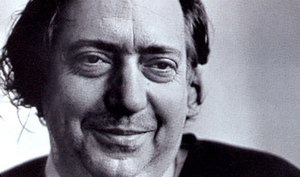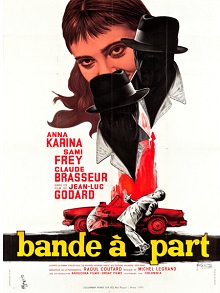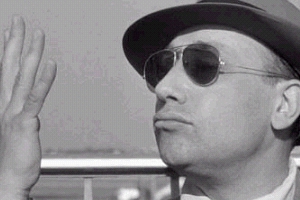Related Research Articles

The cinema of France comprises the film industry and its film productions, whether made within the nation of France or by French film production companies abroad. It is the oldest and largest precursor of national cinemas in Europe; with primary influence also on the creation of national cinemas in Asia.

Jean-Luc Godard was a French and Swiss film director, screenwriter, and film critic. He rose to prominence as a pioneer of the French New Wave film movement of the 1960s, alongside such filmmakers as François Truffaut, Agnès Varda, Éric Rohmer and Jacques Demy. He was arguably the most influential French filmmaker of the post-war era. According to AllMovie, his work "revolutionized the motion picture form" through its experimentation with narrative, continuity, sound, and camerawork. His most acclaimed films include Breathless (1960), Vivre sa vie (1962), Contempt (1963), Band of Outsiders (1964), Alphaville (1965), Pierrot le Fou (1965), Masculin Féminin (1966), Weekend (1967) and Goodbye to Language (2014).

Henri Langlois was a French film archivist and cinephile. A pioneer of film preservation, Langlois was an influential figure in the history of cinema. His film screenings in Paris in the 1950s are often credited with providing the ideas that led to the development of the auteur theory.

Breathless is a 1960 French New Wave crime drama film written and directed by Jean-Luc Godard. It stars Jean-Paul Belmondo as a wandering criminal named Michel, and Jean Seberg as his American girlfriend Patricia. The film was Godard's first feature-length work and represented Belmondo's breakthrough as an actor.

Bande à part is a 1964 French New Wave film directed by Jean-Luc Godard. It was released as Band of Outsiders in North America; its French title derives from the phrase faire bande à part, which means "to do something apart from the group". The film is about three people who commit a robbery. It received positive critical reviews, and its dance scene has been referenced several times in popular culture.

Jean-Pierre Grumbach, known professionally as Jean-Pierre Melville, was a French filmmaker. Considered a spiritual father of the French New Wave, he was one of the first fully-independent French filmmakers to achieve commercial and critical success. His works include the crime dramas Bob le flambeur (1956), Le Doulos (1962), Le Samouraï (1967), and Le Cercle Rouge (1970), and the war films Le Silence de la mer (1949) and Army of Shadows (1969).

Jacques Rozier was a French film director and screenwriter. He was one of the lesser-known members of the French New Wave movement and has collaborated with Jean-Luc Godard. Three of his films have been screened at the Cannes Film Festival. In 1978, he was a member of the jury at the 28th Berlin International Film Festival.

Jacques Perrin was a French actor and film producer. He was occasionally credited as Jacques Simonet.

Raoul Coutard was a French cinematographer. He is best known for his connection with the French New Wave period and particularly for his work with director Jean-Luc Godard, which includes Breathless (1960), A Woman Is a Woman (1961), Vivre sa vie (1962), Bande à part (1964), Alphaville, Pierrot le Fou, and Weekend (1967). Coutard also shot films for New Wave director François Truffaut—including Shoot the Piano Player (1960) and Jules and Jim (1962)—as well as Jacques Demy, a contemporary frequently associated with the movement.

Le Signe du lion is a black and white French drama film directed by Éric Rohmer, which was filmed on location in Paris in the summer of 1959 but not released until May 1962. His first full-length work, it is not however one of his Six Moral Tales. Along with The 400 Blows and À Double Tour by Claude Chabrol, who produced The Sign of Leo, it counts as one of the first films of the French New Wave.

Jean-Claude Brialy was a French actor and film director.
Georges de Beauregard was a French film producer who produced works by many of the French New Wave directors. In 1968, he was a member of the jury at the 18th Berlin International Film Festival. In 1983 he was awarded a Special César Award, the French national film prize.

King Lear is a 1987 film directed by Jean-Luc Godard, an adaptation of William Shakespeare's play in the avant-garde style of French New Wave cinema. The script was primarily by Peter Sellars and Tom Luddy. It is not a typical cinematic adaptation of Shakespeare's eponymous tragedy, although some lines from the play are used in the film. Only three characters – Lear, Cordelia and Edgar – are common to both, and only Act I, scene 1 is given a conventional cinematic treatment in that two or three people actually engage in relatively meaningful dialogue.

Histoire(s) du cinéma is an eight-part video project begun by Jean-Luc Godard in the late 1980s and completed in 1998. The longest, at 266 minutes, and one of the most complex of Godard's films, Histoire(s) du cinéma is an examination of the history of the concept of cinema and how it relates to the 20th century; in this sense, it can also be considered a critique of the 20th century and how it perceives itself. The project is widely considered Godard's magnum opus.
The Centre national du cinéma et de l'image animée is an agency of the French Ministry of Culture, and is responsible for the production and promotion of cinematic and audiovisual arts in France. The CNC is a publicly owned establishment, with legal and financial autonomy.

Zoey Francis Chaya Thompson Deutch is an American actress. The younger daughter of director Howard Deutch and actress-director Lea Thompson, Deutch made her acting debut in television during the early 2010s, with roles on Disney Channel's The Suite Life on Deck (2010–2011) and CW's Ringer (2011–2012).

Carole Bienaimé, is a commissioner and board member of Conseil Supérieur de l'Audiovisuel, an independent agency of French government that regulates communications by radio, television, and internet platforms across France and all its territories. She was nominated by the president of the French Senate, Gérard Larcher, in 2017. Bienaimé-Besse used to be a television and cinema producer and a director. She used to be an executive at April Snow Films & Capital. Officier dans l'Ordre des Arts et des Lettres promoted by French Minister of Culture Roselyne Bachelot and Chevalier de l'Ordre National du Mérite French order of merit by President Emmanuel Macron, Bienaimé Besse was a board member of the fund Compte de Soutien de l'Industrie de Programmes Audiovisuels at Centre national du cinéma et de l'image animée. She was also vice-president of Producers Guild in France and a board member of French Producers Society.
Nouvelle Vague may refer to:

Jean Douchet was a French film director, historian, film critic and teacher who began his career in the early 1950s at Gazette du Cinéma and Cahiers du cinéma with members of the future French New Wave.

This is a bibliography of articles and books by or about the director and film critic Jacques Rivette.
References
- ↑ "Nouvelle Vague". ARP Sélection. Retrieved 10 May 2024.
- ↑ Walcott, Escher (4 March 1024). "Zoey Deutch Shocks with Platinum Pixie Hair Transformation — and She Helped Do the Cut Herself!". People. Retrieved 5 March 2024.
- 1 2 Zaffina, Federica (29 March 2024). "Il nuovo film di Linklater omaggerà la Nouvelle Vague". Taxidrivers.it (in Italian). Retrieved 2 April 2024.
- 1 2 Vaz, Robin (11 May 2024). "On y était : sur le tournage de "Nouvelle Vague", le nouveau film de Richard Linklater". Les Inrockuptibles (in French). Retrieved 11 May 2024.
- 1 2 3 Vardhan, Harsh (21 March 2024). "Richard Linklater's Nouvelle Vague Cast Adds Jean-Jacques Le Vessier, Jodie Ruth-Forest, and Jonas Marmy". The Cinemaholic. Retrieved 23 March 2024.
- ↑ Pasquini, Mattia (27 March 2024). "Nouvelle Vague, Richard Linklater come Godard". Ciak Magazine (in Italian). Retrieved 10 May 2024.
- ↑ Perez, Rodrigo (11 October 2023). "Richard Linklater Says He's Shooting "Secret" Project With Ethan Hawke & French New Wave Film Shot In Paris". The Playlist. Retrieved 5 March 2024.
- ↑ King-Clements, Eloise (10 October 2023). ""You're a Freak, Too": Gregg Araki, in Conversation with Richard Linklater". Interview Magazine. Retrieved 5 March 2024.
- ↑ Ruimy, Jordan (5 March 2024). "Richard Linklater's 'New Wave' Starts Production, Zoey Deutch Cast as Jean Seberg". World of Reel. Retrieved 5 March 2024.
- ↑ Morán, David (26 April 2024). "Richard Linklater: «El cine estaba ahí para vender palomitas; ahora lo que busca es nuestros datos»". ABC (in Spanish). Retrieved 9 May 2024.
- ↑ Geisinger, Gabriella (18 March 2024). "Richard Linklater's 'Nouvelle Vague' among first 2024 recipients of CNC funding". Screen Daily. Retrieved 18 March 2024.
- ↑ "Avance sur recettes avant réalisation : résultats de la commission du 29 février 2024" (in French). Centre national du cinéma et de l'image animée. 29 February 2024. Retrieved 18 March 2024.